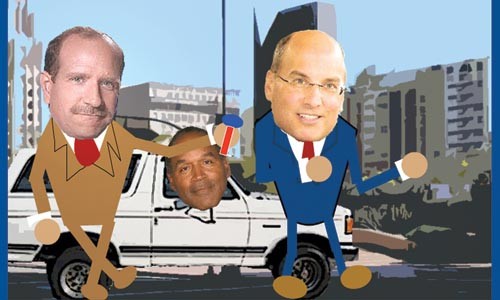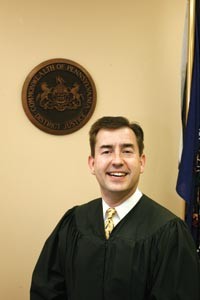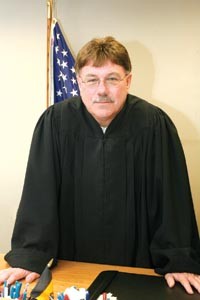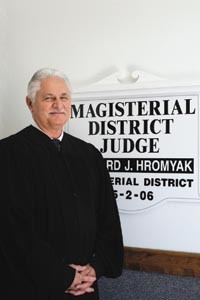Jim Motznik is going to be a district judge.
Yes, that Jim Motznik. The guy who, as a Pittsburgh city councilor, once wore sewer boots to a meeting as a stunt. The guy who in 2004 was chased by a WTAE-TV news crew, who wanted to know why he seemed to be double-charging taxpayers for mileage reimbursements. ("Councilman, we got the fuel records," reporter Jim Parsons shouted as Motznik ducked into a bank to escape the camera. "Why are you running?")
But if it's hard to imagine Motznik upholding the dignity of the law, consider the alternative. Motznik's rival in the May 19 primary was Michael Diven. Yes, that Michael Diven. The guy who has twice run campaigns in which aides have been charged with forging signatures on election petitions. The guy who, in a stint as a state representative, wrote an e-mail to party leaders telling them not to "write checks your body can't cash."
Predictably, the election contest between them -- to replace Charles McLaughlin for district judge in the South Hills -- became the stuff of farce. The highpoint: a Diven-produced online video mocking his opponent's camera-dodging episode (http://whyareyourunning.com). The South Park-style animation pared a fleeing Motznik with a rendering of O.J. Simpson pulling alongside in a white Bronco. It also showed Diven himself, running with the bulls in Pamplona, Spain.
These were the choices facing voters in the South Hills as they tried to find a suitable replacement for Charles McLaughlin, who is retiring after serving as district judge for 24 years. Neither Diven nor Motznik has a law degree. But in that sense, at least, they aren't unusual.
Magisterial district judges are on the front lines of Pennsylvania's court system -- the gatekeepers and peacekeepers, they call themselves. They handle landlord-tenant conflicts and other neighborhood disputes, and they preside over preliminary hearings for criminal cases. Last year, Allegheny County's 48 district judges handled more than 312,000 cases.
Still, to become a district judge, candidates must merely be 21, live in their magisterial district for at least a year and pass a month-long training course. Less than one-third of the county's district judges, each of whom earns $76,508, are attorneys. The rest have varying backgrounds: insurance salesmen, secretaries, real-estate agents, police officers.
Supporters of the system say that at this level, the most important qualification a judge can have is not a law degree, but neighborhood knowledge and common sense. Even so, there are concerns that district judges aren't qualified to levy fines, set bonds or put citizens behind bars.
Then again, Motznik may find his background particularly suited to his new post. As District Judge Leonard Hromyak, of Penn Hills, jokes, "[District court] is Jerry Springer, Judge Judy and Maury Povich all combined in one."
On any given day, most district courtrooms look the same. A couple dozen people file into small waiting rooms, where they sit silently or grumble about the long wait -- everyone has a 9 a.m. appointment. Meanwhile, private lawyers, district attorneys and public defenders mill about the room, whispering over their cases.
Many of those waiting are in trouble for being truant from class, or are involved in neighborhood disputes, about, say, overgrown grass. Judge McLaughlin, who will be surrendering his bench to Motznik at the end of the year, says he often witnesses neighbors' relationships "deteriorate over stupid shit. That's what it's called in legal talk: stupid shit."
District judges hear a wide range of cases, but their jurisdiction is limited. In civil cases, they can only handle matters involving less than $8,000. For criminal arraignments, judges merely apprise defendants of the charges against them, set bail and notify suspects of their preliminary hearing. And at the preliminary hearing level, where they preside over serious criminal matters, judges only have to determine whether the prosecution has established a prima facie case: Was there a crime committed? And is it likely that the defendant was the one who committed it?
The district-judge system was born in 1968 as part of a state Constitutional Convention intended to overhaul government. Previously, the state's minor courts were a mish-mash of judiciaries descended from Old England -- judges were known as aldermen, burgesses or justices of the peace.
According to Allegheny County Common Pleas Judge Joe James, the old system was plagued with problems. In boroughs, for example, the mayor sometimes served as one of the burgesses, even though he hired the police chief. Also, because the courts weren't run by the state, many of the court offices relied on fines to operate. "Obviously I'm going to find you guilty if my water bill is due," James jokes. "The whole thing was insane."
But the new system has its critics, too -- especially those who worry that people's first encounter with the legal system will likely be with a judge who has no law degree.
"If people see judges not really being bound by the law, it will break down people's belief in the legal system," argues David Harris, a law professor at the University of Pittsburgh. "When you don't have grounding in basic legal concepts, you begin trying to jump to 'cut-to-the-chase' justice."
Harris points to New York state's district-judge system, which was investigated by The New York Times in 2006. The paper found that many district judges -- nearly three-quarters of whom were not lawyers -- were denying people fundamental rights, jailing defendants illegally and sentencing some to weeks in jail for failing to pay small fines.
There's little sign of such problems in Pennsylvania -- in part because here, unlike in New York, the district justices are managed by the state court system. But even here it can be frustrating for a lawyer to present a case before non-lawyer judges, Harris says. "If you walk out [of the courtroom] with a loss -- not because you don't have a good argument, but because the judge can't fully grasp the legal argument -- that's not just personally frustrating, that's wrong."
For perhaps obvious reasons, few attorneys wanted to speak on the record about their grievances with the system. A spokesman for the county's district attorney's office would not comment for this story, and the public defender's office did not return multiple phone calls.
But "I hear fellow members of the bar [association] grouse with some frequency about appearing before non-lawyer [judges]," says Duquesne law professor Joe Mistick. "Some [judges] don't even give a tip of the hat to the law. And that's not good." Sometimes, a judge takes up the side of a neighborhood resident over an outsider -- either because of neighborhood loyalty or to help ensure re-election. "Home cookin'," Mistick calls it.
As an attorney, "Anytime a judge favors a constituent over your client, that's a nightmare," he says. "There are times when that happens."
Sometimes, the judges are simply in over their heads. Mistick remembers one story in which a suburban district judge was discussing an upcoming case with a defense attorney and a prosecutor. "The prosecutor said, 'Judge, I think you should just read them the Riot Act and send them home,'" he recalls. "And the judge said, 'Well, which of these books is that Riot Act in?'
"Everybody got a great charge out of that," Mistick says.
But while Mistick says he's "seen the failings of untrained [judges], I've probably seen greater strengths.
"It's good for lawyers to have to argue their case to an average guy or gal," Mistick says.
"What we do involves a lot of common sense," says District Judge David Barton, who handles cases in suburbs like Whitehall and Baldwin. While Barton himself is a lawyer, he says "Lawyers, as we know, haven't cornered the market on common sense." His own background, he acknowledges, allows him to "spot some issues that [district judges] might not see without formal training." But, "In most cases we're not looking for a hypertechnical solution."
The state does provide a mandatory month-long training course for new district judges, who must then pass a four-hour long final examination. (Attorneys are exempt from the requirement.) If they fail, they can retake the exam until they pass.
"It's basically a condensed law school," says Susan Davis, the judicial education administrator for the state's Minor Judiciary Education Board, which runs the training program. "It's a fairly comprehensive course."
Davis says the training covers all the cases district judges will hear. In addition to the month-long course, judges must attend a yearly week-long course to keep them updated on changes in the law.
It's hard to know how rigorous the training is. City Paper was denied a copy of the state's exam -- or even some sample questions from prior years. But Pennsylvania's test "is a legitimate exam," Barton says, with questions that are at least more difficult than some of those on New York's test. (According to The New York Times, one sample test question for the New York district judges asked, "True or False: Town and village justices must maintain dignity, order and decorum in their courtrooms.")
According to District Judge Richard King, in some ways, the training district judges receive from the state is better than law school, which offers much broader training.
"Many attorneys that become judges actually struggle when they first start," says King, whose courtroom serves southern city neighborhoods such as Allentown and Beltzhoover. "They call me to explain landlord-tenant cases. ... We are highly trained for the niche that we serve."
"There is an argument to be made that [district judges] should be lawyers," says Donna Jo McDaniel, Allegheny County's President Judge. Her duties include supervising the county's district judges. "However, some of my best [district judges] are non-lawyers.
"Getting three years of law school doesn't necessarily give you the ability to deal well with people," she continues.
But the minimal qualifications for the post exacerbate a broader concern: the fact that all judges in Pennsylvania are elected.
"Elections aren't necessarily the best way" to put the most qualified judges behind the bench, says Shira Goodman of Pennsylvanians for Modern Courts, which seeks to reform the state's court system.
Just a few years ago, though, Pittsburgh did have appointed judges -- many of whom were lawyers. And some say the courts were better because of them.
Before 2005, most of Pittsburgh's felonies and misdemeanors were handled by judges known as city magistrates. The magistrates were appointed by the mayor and approved by city council.
"The mayors took a serious interest in [hiring] lawyers," says Common Pleas Judge Joe James. James himself served as a city magistrate under Mayor Richard Caliguiri, and handled administrative matters as its chief magistrate from 1983-87.
In fact, many of the city magistrates, like James and McDaniel, went on to become Common Pleas Court judges (James also became President Judge). "They put some very strong people in there," he says.
Because the appointed city magistrates had strong legal backgrounds -- most of them came from the district attorney's office or the public defender's office -- James says they ran a tight ship. Most importantly, he says, they knew which cases should be settled in their courtroom, and which ones needed to be sent to the Court of Common Pleas for trial.
Rather than working from offices in the neighborhoods, the magistrates worked in the Municipal Court building, next door to the county jail.
The goal, he says, was to "separate the wheat from the chaff. ... The whole mantra we were trained with was: 'Don't send crap.'
"It was slick," he continues. "It worked."
At the same, though, taxpayers were paying for a roster of district judges out in the neighborhoods. And with magistrates handling most of the city's caseload Downtown, the justices "were pretty sleepy," recalls James. "There wasn't much going on."
In 2000, for instance, one district judge handled just over 500 cases, only 36 of which were criminal matters.
Meanwhile, the state was paying the salaries of district justices, but the city alone bore the cost of its magistrate system. As its finances became increasingly strapped, says Duquesne's Joe Mistick, the magistrates "became a luxury that the city couldn't afford."
Between elected judges that weren't doing much, and appointed judges the city couldn't afford, something had to give. James and others supported keeping the magistrates and getting rid of the district judges within city limits. "I thought, if you put strong people in there, it worked better than having elected [judges]," James remembers. But district judges lobbied heavily for the elimination of the city magistrates, and then-Mayor Tom Murphy agreed.
The appointed magistrates were scrapped in 2005. The city's 13 district judges handle cases in their district offices a few days a week, but they also rotate through Municipal Court. There, they sit in on arraignments, as well as housing and traffic disputes. In addition, they preside over preliminary hearings for criminal cases.
District Court Administrator Ray Billotte decided to keep the basic framework of city court, but he and his staff devised a system to balance out caseloads between city district judges. Judges with lighter caseloads in their district spend more time Downtown than judges with heavier caseloads.
Billotte also sought to streamline court procedures. Under the old city magistrate system, case files weren't computerized -- something the state quickly moved to change.
"It was unbelievable," he says. "A court that was that busy did not have a system with which they could help manage their inflows and outflows."
But some say that having an antiquated filing system actually sped things along.
Take, for instance, a man cited for public urination on the South Side. In the old days, James says, "We'd let him plead guilty to disorderly conduct or public intoxication" -- and defendants took the deal in part because the plea was "put in a filing cabinet. ... [T]hose records weren't going anywhere."
Now, James says, "you have this computerized system where all these records are there forever. ... It's one of the dynamics that makes it harder to settle cases." More defendants, he contends, are taking their case before a common-pleas judge, rather than agreeing to put a blot on their electronic record.
Nor does a district judge have much incentive to be lenient, James says: "If the community believes that the judge is giving too many slaps on the wrist, then [the judge is] liable to lose the election.
"The judges [in the higher] courts complain," continues James. "You get a case where somebody is charged with theft of rented property for not taking two movies back to West Coast Video. ... There's a lot of that."
Jeffrey Manning, the administrative judge for the criminal division of the Court of Common Pleas, declined to comment for this story. And Billote says that there aren't statistics available to either prove or disprove James' theory. Still, he says, "I know of no dramatic increase in the number of [minor] cases coming into the Court of Common Pleas."
Even if there were a dramatic increase, says District Judge King, the blame can't be placed solely on the judges. "Sometimes a judge has no choice" but to send it up the ladder. But, he adds, Common Pleas Court "is not flooded with minor cases. We do a good job of filtering them out."
Sometimes it's easy.
On May 4, District Judge Gene Ricciardi sat behind the bench in housing court, located in a second-floor courtroom in the municipal building. The South Side judge had just levied fines against a man accused of harassing his neighbors, and dismissed criminal mischief charges against a teen-ager cited for denting a truck with a rock.
After the courtroom cleared out, Ricciardi sifted through a small pile of citations, chuckling at some. "Here," he said, pushing a disorderly-conduct citation to the front of the bench, "this happened on St. Patty's Day."
According to the citation, an intoxicated young man began urinating in a Dumpster during the holiday festivities in Market Square, Downtown. When approached by officers, the citation reads, the man "became uncooperative and stated, 'You're gonna write me [up] for pissing in a Dumpster?'"
Smiling, Ricciardi said, "That guy pleaded guilty."
District Judge David Barton
Years on bench: 13
Jurisdiction: Whitehall, Baldwin, Castle Shannon
Professional background: Attorney
Judicial highlight: Barton's district includes Prospect Park, a community of rental properties with a large population of refugees from around the world. As a result, the judge says, "[Our courtroom] has all kinds of crazy interpreter stories."
Barton says he once had to postpone the criminal case of man charged with simple assault because the defendant spoke no English, only Kunama. After doing some research, Barton found that the language is spoken only by natives of the tiny African nation of Eritrea, which borders Ethiopia. Luckily, the court was able to track down a Pittsburgh resident who spoke Kunama. The problem, Barton says: "He was the victim in the case."
District Judge Charles McLaughlin
Years on bench: 24
Jurisdiction: South Hills neighborhoods of the city
Professional background: Insurance salesman
Judicial highlight: On the bench for arraignment court one Sunday afternoon, McLaughlin remembers "having a little fun" with a man who had been arrested the night before for stealing birth-control pills from his neighbor's house. "I said, 'Now, if this woman should become pregnant while those pills are in the possession of the police, you're going to have to pay for that child until he's 18,'" the judge recalls. "He looked at me and said, 'But I'm a pillhead, Mr. McLaughlin! I couldn't afford that!' Everybody was laughing, and he was walking around saying, 'I'm not going to have to do that, am I?'"
District Judge Richard King
Years on bench: 16
Jurisdiction: Southern "hilltop" communities in Pittsburgh
Professional background: Steamfitters union contractor
Judicial highlight: Complaints about cable companies are a dime a dozen. But King recalls one woman who approached a district attorney seeking to file criminal charges against her cable company. "She said they were reversing her cable and spying on her through her television," he says. "The DA explained that that was impossible to do, that [the cable company] couldn't turn her TV into a camera."
The woman persisted. And in an effort to appease her, the district attorney offered some advice: "He told her to put aluminum foil behind her TV," King says. "She came back a month later and said it worked."
District Judge Leonard Hromyak
Years on bench: 12
Jurisdiction: Penn Hills, Verona
Professional background: Police officer
Judicial highlight: Hromyak says he's heard almost every possible excuse from people trying to wiggle out of traffic tickets. But some defenses are more creative than others. Hromyak recalls a case that came before him six years ago, when he was running for re-election and had two large billboards posted in town. When a man approached Hromyak's bench to argue his case against a traffic ticket, the defendant said, "'Judge, I was actually looking at your billboard, and I didn't realize the light turned red before I made the left turn,'" recalls Hromyak. "The next person up had the same red-light violation. I said, 'Don't you think that you're going to use that excuse.'"





